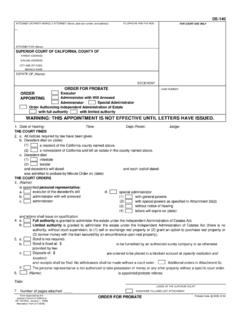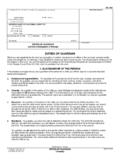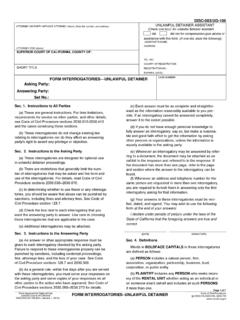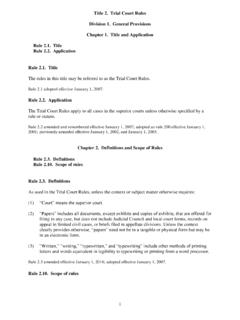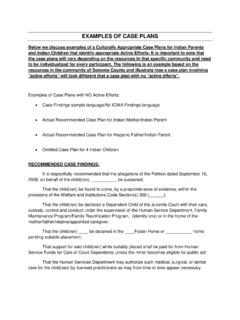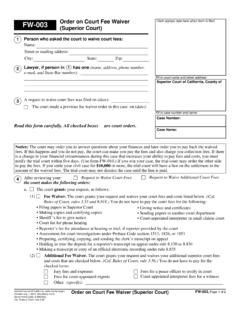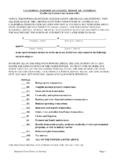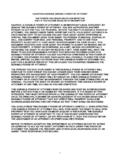Transcription of CERTIFIED FOR PUBLICATION - courts.ca.gov
1 Filed 9/13/19. CERTIFIED FOR PUBLICATION . IN THE COURT OF APPEAL OF THE STATE OF california . FOURTH APPELLATE DISTRICT. DIVISION THREE. ELIZABETH LEVIN, Plaintiff and Appellant, G056353. v. (Super. Ct. No. 30-2017-00912251). DEBRA WINSTON-LEVIN, Individually OPINION. and as Trustee, etc., Defendant and Respondent. Appeal from a judgment of the Superior Court of Orange County, Jacki C. Brown, Judge. Affirmed. Lurie, Zepeda, Schmalz, Hogan & Martin and Troy L. Martin for Plaintiff and Appellant. Hart | King, William R. Hart, Andrew C. Kienle, and Rhonda H. Mehlman for Defendant and Respondent. * * *. In 1986, Robert Levin established a revocable trust named, quite simply, the Robert Levin Trust (the Levin Trust). The Levin Trust was thereafter amended several times: in 1993, 2002, 2005, 2006, 2008, 2011 and 2012.
2 After Robert passed away in 2015, litigation erupted, principally over the 2008 and 2012 amendments to the Levin Trust. Elizabeth Levin, Robert's daughter from a prior marriage, sued Robert's widow, Debra Winston-Levin, on multiple grounds which, by the time the matter went to trial, had devolved into causes of action for an order compelling the return of certain Levin Trust property pursuant to Probate Code section 850, and for double damages 1. pursuant to Probate Code section 859. The Levin Trust had twice been amended to benefit Robert's current wife, Debra, at the expense of his daughter Elizabeth. The first amendment, in 2008, was at the outset of Robert's declining mental condition; the second amendment, in 2012, was well into that decline. The court found Debra had not exerted undue influence as to the 2008.
3 Amendment. As to the 2012 amendment, however, the court found a presumption of undue influence went unrebutted by Debra. As a result, the court voided the entire 2012. amendment and ordered Debra to return property she had obtained pursuant to the 2012. amendment and a related deed. Debra, however, did not appeal; Elizabeth did. Elizabeth contends the court erred in three ways. First, she argues the court's finding of undue influence compelled a finding that Debra was liable for financial abuse of an elder, which, in turn, compels an award of double damages under Probate Code section 859. Her argument raises a close question of statutory interpretation, but we ultimately disagree, concluding the court correctly interpreted that section to apply only where the undue influence was exerted in bad faith, which the court declined to find.
4 Second, Elizabeth contends the 1. We will refer to the parties throughout this opinion by their first names to avoid confusion; all parties involved share the surname Levin in one form or another. No disrespect is intended. 2. evidence compelled a finding that undue influence tainted the 2008 amendment as well. We disagree; the court's ruling was supported by substantial evidence. Finally, Elizabeth contends the court erred in voiding the entire 2012 amendment rather than carving out only those portions that benefited Debra. We conclude otherwise, finding that a reasonable inference from the cumulative changes in the amendment are that they were intended to be intertwined, such that voiding only those portions benefiting Debra would not effectuate Robert's intent. Accordingly, we affirm the judgment.
5 FACTS. History of the Levin Trust Amendments Debra was Robert's wife for the last 20 years of his life. Elizabeth is Robert's only child from a prior marriage, an adult whom he supported financially between 1985 and 2012. Robert purchased residential property on Balboa Island in 1987, which was after divorcing Elizabeth's mother, but before meeting Debra. The court described the property as his dream, which he renovated to his taste and specifications. He married Debra in 1992. In 1993, Robert quitclaimed the Balboa Island property to another trust he had established named the Robert Levin Personal Residence Trust (Residential Trust). Around the same time, he restated the Levin Trust to grant Debra a life estate in the net income of the trust upon Robert's death, as well as principal, as needed, to support her standard of living.
6 Upon Debra's death, the res of the Levin Trust would flow into a trust created for Elizabeth. In 2002, the Levin Trust was amended and restated along similar lines to the 1993 restatement. However, the 2002 amendment clarified that the trustee could withhold distributions to Elizabeth if her level of financial responsibility, her mental 3. condition, or any use of drugs would adversely affect her ability to manage the funds to be distributed. In 2005, Robert amended the Levin Trust to make Debra the first successor trustee. In 2006, Robert executed a codicil to his will in which he elected to distribute property, which was subject to his power of appointment in the Residential Trust, to a trust created for Debra upon his death under the terms of the Levin Trust. Under the 2002 amendment to the Levin Trust, the effect of this election was that Debra would be free to reside in the Balboa Island house rent free for the remainder of her life.
7 In January 2008, Robert underwent an MRI brain scan because he was experiencing memory loss. A doctor found mild atrophy in the brain, but noted Robert was alert and oriented. Memory and abstracting ability were normal. In September 2008, Robert underwent a major surgical operation on his back. Robert amended the Levin Trust again in December 2008 this amendment is a focus of the present appeal. The most significant change was that, upon Robert's death, the residence was to be distributed to Debra outright and free of trust. Debra was present at the meeting between Robert and his attorney that led to this amendment. In April 2009, Robert's doctor wrote a letter indicating Robert's mental condition was beginning to deteriorate. After summarizing Robert's recent history, the doctor stated, [Robert's] wife is now complaining that he is becoming progressively more forgetful and he is losing executive function and can't make decisions, and is sometimes irritable.
8 He is excessively drowsy and sleeps 12 hours or more a day. The doctor examined Robert and found him to have normal speech. He is cooperative and alert. He is able to name objects and repeat phrases. On the Mini Mental Status Examination he scored 29 out of 30, short-term memory being a bit poor. The doctor concluded Robert had mild cognitive impairment.. 4. In November 2011, Robert amended the Levin Trust again to name Debra as co-trustee of the trust. Debra testified he did this because he was thinking of the future and cognizant of his advancing age and declining physical condition. Prior to amending his trust, his attorney urged him to obtain a letter from his doctor affirming Robert's capacity to make financial decisions. In response, Robert's neurologist penned the following letter: Robert Levin has been a friend of mine for 20 years plus and I have advised him occasionally on medical issues.
9 Based on my frequent interaction with him, it is my opinion that he is capable of taking care of his own affairs including financial decisions. Another doctor who was treating Robert for a mild stage of probable Alzheimer's disease wrote, In considering Mr. Levin's current capacity of executive functioning, it is clear that he still has the ability to handle his own estate planning decisions and affairs. Moreover, he maintains the ability to conduct and manage his own finances at the present time.. In February 2012, Robert's mental condition was assessed by a different doctor. He had been referred by Debra in order to evaluate changes in cognitive and mood symptoms. Robert had reported lapses in short-term memory and mood symptoms, which he described as stubbornness.' Debra further reported that she was having to take over certain daily tasks for Robert.
10 For example, she managed his medications, selected his clothes and reminded him when to change them. Debra reported that if Robert's meal was interrupted with a phone call, afterward he would forget that he had been eating. Debra also complained that Robert had recently started making impulsive financial decisions, such as opening and closing bank accounts, and that his driving was becoming dangerous. Both Debra and Robert said his mental condition declined after his back surgery. Debra also noted that he was unofficially diagnosed with dementia of the Alzheimer's type by a research assistant but no formal assessment was done. That resulted in Robert taking an experimental drug for dementia. As part of the assessment, Robert described his family relations. He described his 5. relationship to Elizabeth as strained with minimal communication.


